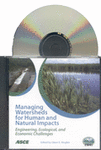Management of Water Resources Crossing Political Boundaries: An Example from the Central Coastal Plain Capacity Use Area of North Carolina
Publication: Managing Watersheds for Human and Natural Impacts: Engineering, Ecological, and Economic Challenges
Abstract
In August 2002, North Carolina passed the Central Coastal Plain Capacity Use Area (CCPCUA) Rule to regulate groundwater withdrawal from the Cretaceous aquifers in order to minimize serious water level declines and salt water intrusion that have been progressively worsening in these aquifers. The major groundwater impacts are being observed in two principal aquifers, the Black Creek and Upper Cape Fear, which have been desirable sources of high-quality, low-cost drinking water throughout this 15-County region. The regulations require groundwater withdrawals from the most affected portions of the region to be limited to 1997 withdrawal rates and may be further reduced by up to 75% over a 16-year period ending in 2018. The regulations are meant to avoid permanent damage to the aquifers and to help support economic growth in the region by having a sustainable water supply through development of alternative water supplies and by promoting water conservation and reuse. The North Carolina Rural Center undertook a study to determine the effects of the CCPCUA Rule, evaluate current and future water supply needs and sources, identify water supply alternatives, and estimate the costs of compliance for 122 public water supply systems affected by this Rule. If fully implemented, the CCPCUA Rule will directly impact over 40 public water systems and will result in the elimination of 38 million gallons per day (mgd) of existing groundwater sources. Replacement of these sources and development of alternative water supplies to meet future 2020 water demand is estimated to cost more than $250 million. Alternative water sources identified by the study include: 1) development of alternate groundwater supplies from underutilized aquifers; 2) development of surface water sources; 3) regionalization of water systems to allow more efficient use of existing water supplies; 4) water conservation, demand reduction, and water reuse; and 5) non-traditional sources such as brackish water, mine dewatering supplies, horizontal collector wells, and aquifer storage and recovery. Regional cooperation will be an important opportunity, allowing economy of scale in addressing aggregate demand, cost sharing, uniform rates, and bond-issuing authority.
Get full access to this article
View all available purchase options and get full access to this chapter.
Information & Authors
Information
Published In
Copyright
© 2005 American Society of Civil Engineers.
History
Published online: Apr 26, 2012
Authors
Metrics & Citations
Metrics
Citations
Download citation
If you have the appropriate software installed, you can download article citation data to the citation manager of your choice. Simply select your manager software from the list below and click Download.
